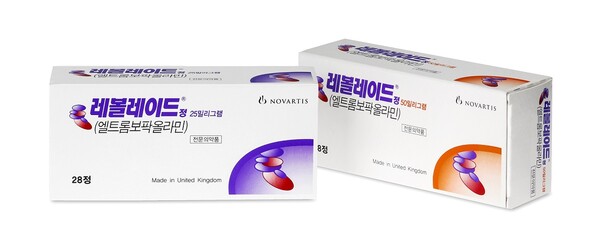Novartis Korea said Tuesday that its immune thrombocytopenia treatment Revolade (eltrombopag olamine) received expanded reimbursement from health insurance on June 1 to allow for prescription without splenectomy.
The coverage expansion will allow Revolade to be prescribed without splenectomy in patients with immune thrombocytopenia. The approved indication for Revolade has been revised from “splenectomized patients refractory to corticosteroids and immunoglobulins and patients refractory to corticosteroids and immunoglobulins for whom splenectomy is medically contraindicated” to “patients refractory to corticosteroids and immunoglobulins.”

Revolade is a TPO-Receptor Agonist (Thrombopoietin-RA) therapy indicated for treating hypothrombocytopenia in patients with chronic immune (idiopathic) thrombocytopenia who have not had an adequate response to corticosteroids, immunoglobulins, or splenectomy. It is an effective treatment for immune thrombocytopenia because it stimulates platelet production by stimulating the TPO receptor.
In the EXTEND phase 3 study, Revolade demonstrated long-term treatment efficacy and quality-of-life benefits in patients with immune thrombocytopenia. In the long-term study, with a median follow-up of up to 8.8 years (median 2.4 years), the median platelet count increased to >50x109/L at week 2 of the study, with 85.8 percent of patients achieving a platelet count of >50x109/L at least once without rescue therapy.
The study also confirmed rapid platelet response and long-term maintenance of effect, with 52 percent of patients maintaining this response for at least 25 weeks, and clinical utility, with a reduction in bleeding risk by more than half from baseline.
Within three months of treatment, patients reported improvements in fatigue, their biggest challenge, and these benefits were sustained for more than five years, improving overall patient health-related quality of life.
In patients with immune thrombocytopenia, splenectomy is a treatment to increase platelet counts by removing the spleen, the organ where platelets are destroyed. However, it is associated with adverse side effects, including general anesthesia-related mortality and long-term complications, such as infection and venous thromboembolism following splenectomy. Until now, patients with immune thrombocytopenia have had to undergo a splenectomy before being prescribed Revolade.
The expansion of coverage will allow patients to be prescribed Revolade without the prerequisite of splenectomy, reducing the treatment burden on patients and enabling the preferential use of TPO-RA therapy as the national and international guidelines recommend.
Korean and international guidelines recommend TPO-RA therapies, including Revolade, over splenectomy in patients with immune thrombocytopenia. Major global guidelines, such as the American Society of Hematology (ASH) and the International Consensus Report, recommend TPO-RA therapy over splenectomy. In Korea, the “Management of immune thrombocytopenia: 2022 update of Korean experts recommendations,” published by the Korean Society of Hematology in March last year, also recommended TPO-RA therapy like Revolade over splenectomy in the treatment of patients with immune thrombocytopenia
“TPO-RA therapies such as Revolade have been recommended before splenectomy for the treatment of immune thrombocytopenia. However, for reimbursement, patients had to undergo splenectomy despite its side effects,” said Professor Jang Jun-ho of the Department of Hematology-Oncology at Samsung Medical Center. “This reimbursement expansion will allow patients with immune thrombocytopenia in Korea to receive treatment per the updated guidelines. We look forward to seeing more patients benefit from Revolade.”
Related articles
- Novartis' radiotherapy drug Pluvicto gets nod in Korea
- Health experts pour out ‘radical’ solutions at Radical Health Festival in Finland
- Kymriah CAR-T therapy: a journey of controversy to clinical success in Korea
- Novartis' rare disease drug Ilaris passes health insurance review panel
- Interest grows in Novartis’ Illaris as new weapon against hereditary recurrent fever syndrome

